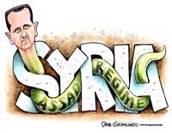
We did not have a proper debate on this conflict, but simply gathered answers to a few basic questions, and the collective wisdom is summarized as following.
The majority opinion of the group is that the political crisis in Syria has already escalated to a civil war. It is always problematic to apply the strict academic definition, and in this case the problem is complicated by the very deliberate muddling of this question by both sides. The government presents its violence as a struggle against terrorists and Islamic extremists (giving a high number of casualties in the army and police), while presenting the demonstrations as a part of democratic process made possible by the lifting of the Emergency Law (which is construed as evidence of absence of civil war). The opposition argues that the government is guilty in one-sided violence (hence the high number of civilian casualties) but also exaggerates the strength of the Free Syrian Army.
There is also a strong opinion that the al-Assad regime will not survive the Year 2012, but its toppling would require a greater external pressure than that generated in the autumn of 2011. A UN intervention or a UN mandate for a R2P-type action is not presumed to be possible, so the main legitimacy-provider for an intervention could only be the Leage of Arab States or an ad-hoc group of concerned neighbours. Turkey might play a central role in orchestrating the regime change in Syria through an intervention, pursuing its own particular interests related to the Kurdistan and greater ambitions related to regional leadership. Qatar is eager to spin publicity and intrigue.
Neither China nor Russia are likely to change their stance on precluding any external intervention in this civil war. For China, it is the matter of upholding the principle of non-interference in domestic affairs, and for Russia it is largely a matter of distancing from NATO and building a common position with China. In the singular opinion of the chairman of the group, the short port-visit of Russian aircraft carrier Kuznetsov to Tartus in early January amounts to a grave political mistake caused primarily by the preoccupation of the Kremlin with the street protests against the regime on the eve of presidential elections.





